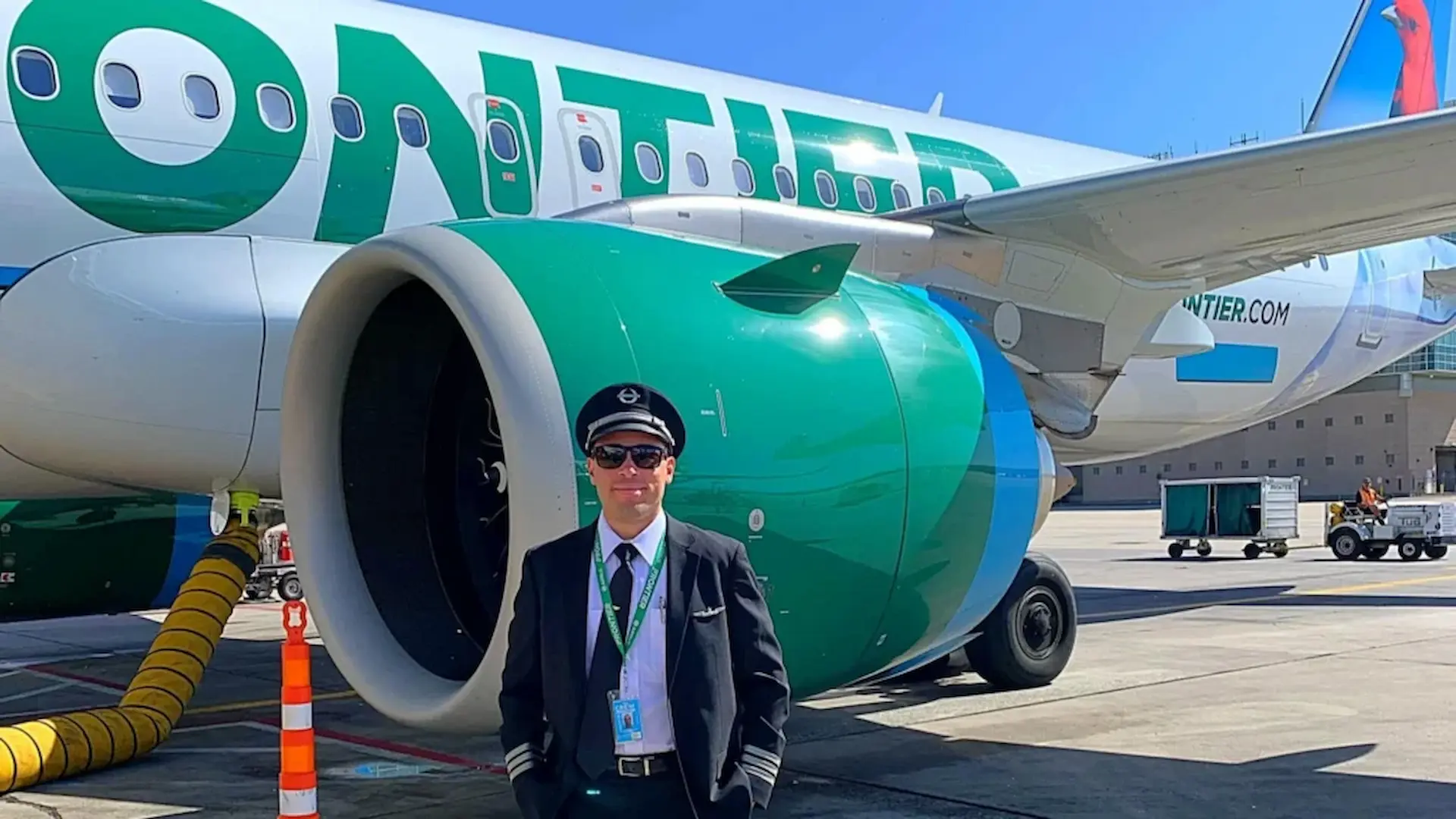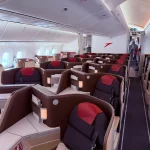The world of airline pilot pay isn’t as glamorous, or as straightforward, as it might seem from 30,000 feet. If you’re considering a career as a pilot, or you’re just curious about how much Frontier Airlines pays its flight crew, you’re not alone. In recent years, pilot salaries have drawn attention due to increased demand, union negotiations, and the economic impact of airline expansion.
Frontier Airlines, known for its ultra-low-cost model, might not pay the highest in the industry, but its growth, quick upgrade potential, and simpler fleet structure make it worth a closer look.
Here’s what you should know about Frontier pilot salaries, how the pay scales work, and how it compares to the rest of the airline industry.
How much do Frontier Airlines pilots actually earn?
Frontier Airlines pilots earn between $60,000 and $265,000 per year, depending on their role and experience level. First Officers, entry-level pilots, start on the lower end of the scale, while Captains with more years of service and higher seniority can reach well over $240,000 annually.
Unlike a fixed salary job, pilots are paid by the hour. At Frontier, this hourly wage varies based on your seat (First Officer or Captain), the number of years you’ve worked there, and the number of hours you fly per month. Most pilots average around 75 flight hours monthly, but those flying closer to 85–90 hours often reach the higher end of the pay spectrum.
In 2023, the median salary for airline pilots across the U.S. was $211,790, according to the Bureau of Labor Statistics. Frontier’s top-level pilots come close to or match that, especially those flying full schedules with holiday premiums.
How does pilot pay scale work at Frontier?
Pilot compensation at Frontier increases with each year of service. First-year First Officers start at an estimated $58 to $65 per hour, with incremental increases each year. After five years, they typically earn $95 to $100 per hour, and by their eighth year, some First Officers may reach $110 to $120 per hour.
Captains, who carry greater responsibility and meet stricter qualification standards, start around $160 per hour. Senior Captains with more than a decade of service can earn between $230 and $250 per hour. These figures multiply quickly with higher flight hours.
Pay is structured as follows:
- Pilots are guaranteed a minimum of 75 flight hours per month, regardless of how many they’re actually scheduled to fly.
- Each year, pilots move up in pay through an established seniority-based scale.
- Extra pay is often available through voluntary trips, holiday work, or training roles.
Union-negotiated contracts govern these rates and guarantees. Frontier pilots are represented by the Air Line Pilots Association (ALPA), which plays a key role in negotiating pay, benefits, and working conditions.
What does a First Officer earn at Frontier?
For new pilots starting out at Frontier, the role of First Officer offers solid entry-level earnings in the ULCC space.
In the first year, a First Officer can expect to earn between $58 and $65 per hour, translating to an annual income of around $52,000 to $60,000 based on minimum hours. With three years of service, that number rises to approximately $72,000 to $76,500, and by the fifth year, First Officers can cross the $90,000 per year threshold.
Compared to airlines like Spirit or Allegiant, which also operate with a low-cost business model, Frontier’s First Officer pay is slightly below average. However, upgrade times at Frontier are often quicker, meaning pilots don’t stay in the right seat for long.
What is the salary range for a Frontier Airlines Captain?
Captains at Frontier take on greater responsibility, and their salaries reflect that. New Captains start around $160 per hour, with pay rising to $250 or more after ten years of service. At 75 hours per month, this equates to $144,000 to $225,000 annually, though many experienced Captains fly more than the minimum and earn closer to $250,000+.
Frontier Captains must hold an Airline Transport Pilot (ATP) certificate and generally have 3–5 years of experience before upgrade. The speed of that upgrade, however, depends on pilot demand and fleet growth, which has been accelerating at Frontier in recent years.
What benefits do Frontier pilots receive?
Salary is only one part of the equation. Frontier offers a robust benefits package that includes:
- Health coverage including medical, dental, and vision plans starting on day one
- 401(k) contributions, with employer matching that can reach up to 13%
- Per diem payments for time spent on duty away from base
- Travel benefits, such as free standby flights for pilots and family
- Paid time off and sick leave, both of which accrue with seniority
- Union representation via ALPA, offering contract protections and collective bargaining
Though Frontier’s base salary may be lower than that of major legacy airlines, these benefits close some of the compensation gap.
How does Frontier compare to other airlines in terms of pay?
Compared to major carriers like Delta or United, Frontier’s pilot salaries are lower, but not dramatically so for entry-level pilots. Here’s a general comparison of hourly rates:
| Airline | FO Starting Pay | Captain Max Pay |
| Frontier | $58/hour | $250/hour |
| Spirit | $60/hour | $250/hour |
| JetBlue | $85/hour | $265/hour |
| Southwest | $95/hour | $310/hour |
| Delta | $92/hour | $340/hour |
| United | $100/hour | $350/hour |
Where Frontier really differs is in career trajectory. Major carriers offer long-term financial benefits, including profit-sharing and more generous retirement plans. However, the time it takes to upgrade to Captain can be considerably longer, 5 to 10 years in some cases.
At Frontier, many pilots upgrade within three to five years, providing faster access to higher pay and more control over schedule bidding.
Do pilot salaries vary based on base location?
Yes, but not because the pay rates change. All pilots are paid the same rate based on their seniority and seat. However, base location affects take-home income due to cost-of-living and schedule quality.
Frontier’s current pilot bases include:
- Denver (DEN)
- Orlando (MCO)
- Las Vegas (LAS)
- Miami (MIA)
- Dallas (DFW)
Pilots based in Denver or Las Vegas often have access to better trip pairings and more flight hours. Commuting from another city to your assigned base can eat into both time and money, which is why many pilots choose to relocate close to their base if possible.
What factors influence a Frontier pilot’s total compensation?
Several key variables impact total yearly earnings:
- Flight hours: Pilots flying over 80–85 hours per month earn significantly more.
- Seniority: Determines access to preferred schedules, days off, and routes.
- Holiday and premium trips: These pay higher hourly rates.
- Reserve vs. line-holding status: Reserve pilots often fly fewer hours.
- Additional roles: Instructors and check airmen receive extra compensation.
Two pilots with the same title and hourly rate could have very different annual earnings depending on how they manage their schedules.
Is Frontier a good long-term career for pilots?
It depends on your goals. For pilots seeking fast upgrades, a modern fleet, and steady flying hours, Frontier offers a compelling path. The airline is aggressively expanding, with over 200 aircraft on order and an increasing share of the domestic market.
However, for those prioritizing top-tier pay, profit-sharing, and international flying, a legacy carrier may offer more. Some pilots use Frontier as a stepping stone to build turbine time and transition to Delta, United, or American. Others stay long-term and enjoy the benefits of seniority and base flexibility.
What do pilots say about working at Frontier?
Most pilot reviews point to a mixed, but improving, experience. According to data from forums like Airline Pilot Central and anonymous reviews on Glassdoor:
- Training quality is consistently praised, especially for new pilots.
- Upgrade timelines are considered fast and achievable.
- Schedules can be inconsistent, especially in junior months or at less popular bases.
- Pay satisfaction has improved following recent union negotiations.
Overall, pilot sentiment has become more positive, especially as Frontier expands and adjusts its compensation to meet industry standards.
How can pilots increase their earnings at Frontier?
Earnings at Frontier aren’t capped at your hourly rate. Pilots can maximize income by:
- Flying high-volume schedules consistently (80–90 hours/month)
- Volunteering for holiday or last-minute trips
- Upgrading to Captain as soon as eligible
- Applying for training and leadership positions
- Selecting productive bases with efficient trip pairings
Earning more often comes down to initiative, flexibility, and smart bidding.
Frequently Asked Questions About Frontier Pilot Pay
Do pilots get paid during training?
Yes, new hires receive a weekly stipend during training, typically between $500 and $1,000.
What’s the pay for working holidays?
Pilots receive premium pay, usually 1.5x their standard rate, for flying on holidays or covering uncovered trips.
Is there a profit-sharing plan?
Not currently. Frontier does not offer profit-sharing, unlike Delta or Southwest.
How financially stable is Frontier as an employer?
As a publicly traded company (NASDAQ: ULCC) with ongoing aircraft orders, Frontier shows strong financial positioning and aggressive growth, making it a stable choice for pilots entering or continuing their careers.





